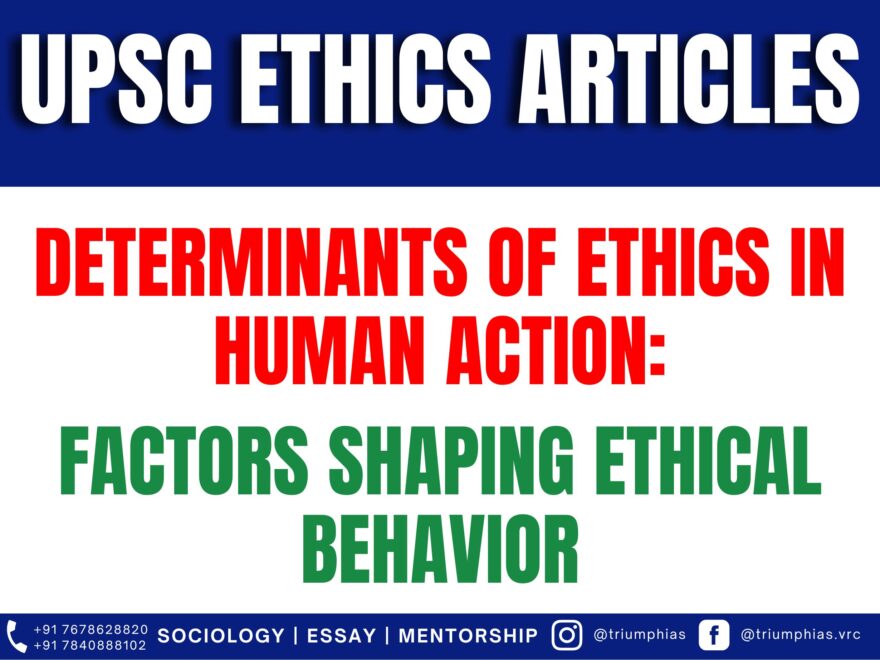Determinants of Ethics in Human Action
(Relevant for Ethics, Integrity and Aptitude)

As implied by the term, ‘determinants’ refer to the elements that ascertain whether the assessed action is ethical or not.
Nature/Object of the Act:
- One of the criteria for evaluating the morality or virtuousness of human deeds is their inherent nature. Every action possesses a distinct essence that sets it apart from other actions. A specified action may inherently be categorized as good, bad, or neutral. For instance, aiding a visually impaired person across the road is inherently commendable, while engaging in blasphemy is intrinsically wrong. On the other hand, learning to shoot is deemed neutral in itself.
- Nevertheless, certain forms of actions are designated as intrinsically wicked or immoral due to their inherent moral connotations. An intrinsically evil action is perpetually wrong and sinful. It never holds virtue, appropriateness, or usefulness, regardless of the underlying intentions of the individual carrying it out or the surrounding circumstances.
- Reason also acknowledges that particular human actions, by their very nature, are incapable of embodying goodness as they fundamentally clash with the concept of virtue. Examples include rape, the murder of innocent children, or blasphemy.
- Concurrently, specific actions like abortion, embryonic stem cell research, same-sex marriage, and euthanasia are regarded as intrinsically immoral according to the moral standards of specific societies or religions. Even though intentions might occasionally be pure and circumstances challenging, these actions are considered non-negotiable and consequently subject to punitive measures in such societies.
- However, the practice of deeming an action morally reprehensible or sinful without considering the context and intentions might be debatable, disputable, or even invalid within alternate societies.
Circumstances of the Action:
- Each human action within a specific context transpires amid particular circumstances. Consequently, circumstances possess the capacity to influence the morality of an action and contribute an element to its moral essence. The circumstances encompassing a human action encompass aspects such as the timing, location, agent involved, and manner in which the action unfolds. The manner in which varying circumstances impact the rightness or wrongness of actions can be comprehended through the following elucidation:
- In certain instances, circumstances solely influence the moral evaluation of an action to a certain degree, either intensifying or mitigating the moral virtue or malevolence inherent in human deeds. For example, stealing is inherently wrong, but the severity of the act heightens if it involves pilfering a precious possession or taking from someone impoverished. Conversely, if a thief employs a Robin Hood approach, redistributing wealth from the affluent to assist the less privileged, the reprehensibility of their thievery diminishes.
- Certain circumstances introduce a fresh dimension of goodness or badness to an action based on the context in which and the location where the action transpires.
- When: This pertains to whether the action occurs during a time of war or peace. For instance, the culpability of an intelligence officer intensifies if, during wartime, they succumb to threats and divulge highly classified information detrimental to national security while under the control of an enemy nation.
- Where: Similarly, the morality of an action can be influenced by its location. For example, a murder committed within a church or cathedral amplifies the moral transgression beyond the act of murder itself, as it profanes a consecrated place of worship, thus incurring the additional wrongdoing of sacrilege.
- Circumstances also possess the power to mitigate or lessen an agent’s responsibility. For example, a woman who takes the life of an assailant attempting to violate her chastity is absolved of the guilt associated with taking a life.
Individual Factors
- It encompasses knowledge, values, attitudes, and intentions. These aspects are influenced by the prevailing moral philosophy, which subsequently affects the actual process of decision-making.
- Individuals analyze the outcomes of each potential course of action, determining its inherent ethicality (deontological) or assessing the potential benefits and drawbacks (teleological).
- These assessments feed into and shape their individual experiences, which, in conjunction with cultural, industry, and organizational norms, impact the processes of ethical perception and evaluation that initiate the model.
Situational factors
- In the ethical decision-making process, individuals’ significant connections from both their professional and personal lives can influence their choices.
- This encompasses not only broader society but also peers.
- The chance to partake in unethical conduct, along with the incentives and consequences tied to ethical or unethical actions, will inevitably affect the process of ethical decision-making.
- Furthermore, the institution in which an individual is employed also holds substantial sway in shaping their ethical stance.
Other factors
- Nature of action.
- Childhood upbringing.
- Later life experience.
- Religious belief.
- Discussions with others.
- Moral philosopher.
- “Apriori” truth, i.e. like something that we have embedded in us as “knowledge”.
- Self-interest.
To master these intricacies and fare well in the Sociology Optional Syllabus, aspiring sociologists might benefit from guidance by the Best Sociology Optional Teacher and participation in the Best Sociology Optional Coaching. These avenues provide comprehensive assistance, ensuring a solid understanding of sociology’s diverse methodologies and techniques.
ethics, human action, determinants, moral philosophy, deontological, teleological, ethical decision-making, circumstances, nature of action, intrinsic evil, individual factors, situational factors, upbringing, religious belief, moral philosopher, apriori truth, self-interest, society, situation, God, Best Sociology Optional Coaching, Sociology Optional Syllabus, ethics, human action, ethics, human action,

Sociology Optional Syllabus
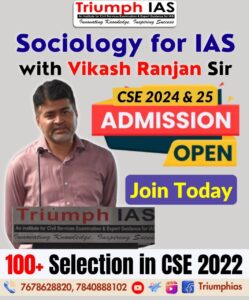
Course Commencement Information
- Enrolment is limited to a maximum of 250 Seats.
- Batch Timing: Evening Batch
- Course Duration: 4.5 Months
- Admission Open For Online/Offline Batch
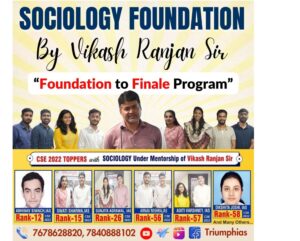
Instructional Format:
- Each class session is scheduled for a duration of two hours.
- At the conclusion of each lecture, an assignment will be distributed by Vikash Ranjan Sir for Paper-I & Paper-II coverage.
Study Material:
- A set of printed booklets will be provided for each topic. These materials are succinct, thoroughly updated, and tailored for examination preparation.
- A compilation of previous years’ question papers (spanning the last 27 years) will be supplied for answer writing practice.
- Access to PDF versions of toppers’ answer booklets will be available on our website.
- Post-course, you will receive two practice workbooks containing a total of 10 sets of mock test papers based on the UPSC format for self-assessment.
Additional Provisions:
- In the event of missed classes, video lectures will be temporarily available on the online portal for reference.
- Daily one-on-one doubt resolution sessions with Vikash Ranjan Sir will be organized post-class.
Syllabus of Sociology Optional
Paper-1
FUNDAMENTALS OF SOCIOLOGY
- Sociology – The Discipline
- Sociology as Science:
- Research Methods and Analysis:
- Sociological Thinkers:
- Karl Marx- Historical materialism, mode of production, alienation, class struggle.
- Emile Durkheim- Division of labour, social fact, suicide, religion and society.
- Max Weber- Social action, ideal types, authority, bureaucracy, protestant ethic and the spirit of capitalism.
- Talcott Parsons- Social system, pattern variables.
- Robert K. Merton- Latent and manifest functions, conformity and deviance, reference groups.
- Mead – Self and identity.
- Stratification and Mobility:
- Concepts- equality, inequality, hierarchy, exclusion, poverty and deprivation.
- Theories of social stratification- Structural functionalist theory, Marxist theory, Weberian theory.
- Dimensions – Social stratification of class, status groups, gender, ethnicity and race.
- Social mobility- open and closed systems, types of mobility, sources and causes of mobility.
- Works and Economic Life:
- Social organization of work in different types of society- slave society, feudal society, industrial /capitalist society
- Formal and informal organization of work.
- Labour and society.
- Politics and Society:
- Sociological theories of power.
- Power elite, bureaucracy, pressure groups, and political parties.
- Nation, state, citizenship, democracy, civil society, ideology.
- Protest, agitation, social movements, collective action, revolution.
- Religion and Society:
- Sociological theories of religion.
- Types of religious practices: animism, monism, pluralism, sects, cults.
- Religion in modern society: religion and science, secularization, religious revivalism, fundamentalism.
- Systems of Kinship:
- Family, household, marriage.
- Types and forms of family.
- Lineage and descent.
- Patriarchy and sexual division of labour.
- Contemporary trends.
- Social Change in Modern Society:
- Sociological theories of social change.
- Development and dependency.
- Agents of social change.
- Education and social change.
- Science, technology and social change.
Paper-2
INDIAN SOCIETY: STRUCTURE AND CHANGE
INTRODUCING INDIAN SOCIETY
- Perspectives on the study of Indian society:
- Indology (GS. Ghurye).
- Structural functionalism (M N Srinivas).
- Marxist sociology (A R Desai).
- Impact of colonial rule on Indian society :
- Social background of Indian nationalism.
- Modernization of Indian tradition.
- Protests and movements during the colonial period.
- Social reforms.
SOCIAL STRUCTURE
- Perspectives on the study of Indian society:
- The idea of Indian village and village studies.
- Agrarian social structure – evolution of land tenure system, land reforms.
- Caste System:
- Perspectives on the study of caste systems: GS Ghurye, M N Srinivas, Louis Dumont, Andre Beteille.
- Features of caste system.
- Untouchability – forms and perspectives.
- Tribal communities in India
- Definitional problems.
- Geographical spread.
- Colonial policies and tribes.
- Issues of integration and autonomy.
- Social Classes in India:
-
- Agrarian class structure.
-
-
- Industrial class structure.
- Middle classes in India.
-
- Systems of Kinship in India:
- Lineage and descent in India.
- Types of kinship systems.
- Family and marriage in India.
- Household dimensions of the family.
- Patriarchy, entitlements and sexual division of labour
- Religion and Society:
- Religious communities in India.
- Problems of religious minorities.
- Patriarchy, entitlements and sexual division of labour
SOCIAL CHANGES IN INDIA
- Visions of Social Change in India:
- Idea of development planning and mixed economy
- Constitution, law and social change.
- Education and social change.
- Rural and Agrarian transformation in India:
- Programmes of rural development, Community Development Programme, cooperatives,poverty alleviation schemes
- Green revolution and social change.
- Changing modes of production in Indian agriculture.
- Problems of rural labour, bondage, migration.
3. Industrialization and Urbanisation in India:
-
- Evolution of modern industry in India.
- Growth of urban settlements in India.
- Working class: structure, growth, class mobilization.
- Informal sector, child labour
- Slums and deprivation in urban areas.
4. Politics and Society:
-
- Nation, democracy and citizenship.
- Political parties, pressure groups , social and political elite
- Regionalism and decentralization of power.
- Secularization
5. Social Movements in Modern India:
-
- Peasants and farmers movements.
- Women’s movement.
- Backward classes & Dalit movement.
- Environmental movements.
- Ethnicity and Identity movements.
6. Population Dynamics:
-
- Population size, growth, composition and distribution
- Components of population growth: birth, death, migration.
- Population policy and family planning.
- Emerging issues: ageing, sex ratios, child and infant mortality, reproductive health.
7. Challenges of Social Transformation:
-
- Crisis of development: displacement, environmental problems and sustainability
- Poverty, deprivation and inequalities.
- Violence against women.
- Caste conflicts.
- Ethnic conflicts, communalism, religious revivalism.
- Illiteracy and disparities in education.
About Vikash Ranjan Sir
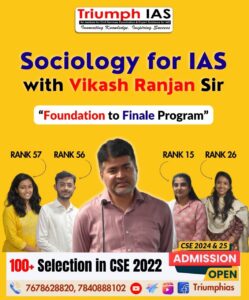
Vikash Ranjan Sir
(Best Sociology Optional Teacher, Educator, Mentor & Author)
Mr. Vikash Ranjan, arguably the Best Sociology Optional Teacher, has emerged as a versatile genius in teaching and writing books on Sociology & General Studies. His approach to the Sociology Optional Syllabus / Sociology Syllabus is remarkable, and his Sociological Themes and Perspectives are excellent. His teaching aptitude is Simple, Easy and Exam Focused. He is often chosen as the Best Sociology Teacher for Sociology Optional UPSC aspirants.
About Triumph IAS

Innovating Knowledge, Inspiring Success We, at Triumph IAS, pride ourselves on being the best sociology optional coaching platform. We believe that each Individual Aspirant is unique and requires Individual Guidance and Care, hence the need for the Best Sociology Teacher. We prepare students keeping in mind his or her strength and weakness, paying particular attention to the Sociology Optional Syllabus / Sociology Syllabus, which forms a significant part of our Sociology Foundation Course.
Course Features
Every day, the Best Sociology Optional Teacher spends 2 hours with the students, covering each aspect of the Sociology Optional Syllabus / Sociology Syllabus and the Sociology Course. Students are given assignments related to the Topic based on Previous Year Question to ensure they’re ready for the Sociology Optional UPSC examination.
Regular one-on-one interaction & individual counseling for stress management and refinement of strategy for Exam by Vikash Ranjan Sir, the Best Sociology Teacher, is part of the package. We specialize in sociology optional coaching and are hence fully equipped to guide you to your dream space in the civil service final list.
Specialist Guidance of Vikash Ranjan Sir

Vikash Ranjan Sir is a specialist and arguably the Best Sociology Optional Teacher. His scientific, systematic, applied & exam-focused approach has helped many students to get selected in the Civil Services.
The Best Sociology Teacher helps students to get a complete conceptual understanding of each and every topic of the Sociology Optional Syllabus / Sociology Syllabus, enabling them to attempt any of the questions, be direct or applied, ensuring 300+ Marks in Sociology Optional.
Classrooms Interaction & Participatory Discussion
The Best Sociology Teacher, Vikash Sir, ensures that there’s explanation & DISCUSSION on every topic of the Sociology Optional Syllabus / Sociology Syllabus in the class. The emphasis is not just on teaching but also on understanding, which is why we are known as the Best Sociology Optional Coaching institution.
Preparatory-Study Support
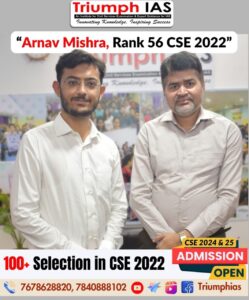
The Sociology Foundation Course is designed to provide students with a strong base for the Sociology Optional. Study support from Triumph IAS & personal mentorship of the Best Sociology Teacher, Vikash Sir, is provided till final selection. Vikash Sir provides special guidance session for “Essay & Mains General Study” too, making our Sociology Course a well-rounded one.
Online Support System (Oss)
Get access to an online forum for value addition study material, journals, and articles relevant to Sociology on www.triumphias.com. Ask preparation related queries directly to the Best Sociology Teacher, Vikash Sir, via mail or WhatsApp.
Strategic Classroom Preparation
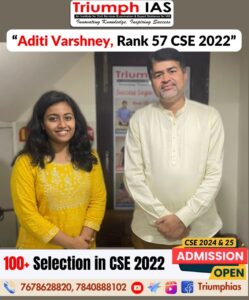
Our Sociology Course is characterized by interactive and applied teaching with an “Exam Focussed” approach, which inculcates a Sociological sense and competency in the students. The Sociology Foundation Course, lasting four months, includes theoretical discussion, concept building, and answer writing with a focus on learning & application.
Comprehensive Study Material
We provide printed booklets of concise, well-researched, exam-ready study material for every unit of the Sociology Optional Syllabus / Sociology Syllabus, making us the Best Sociology Optional Coaching platform.
Why Vikash Ranjan’s Classes for Sociology?
Proper guidance and assistance are required to learn the skill of interlinking current happenings with the conventional topics. VIKASH RANJAN SIR at TRIUMPH IAS guides students according to the Recent Trends of UPSC, making him the Best Sociology Teacher for Sociology Optional UPSC.
At Triumph IAS, the Best Sociology Optional Coaching platform, we not only provide the best study material and applied classes for Sociology for IAS but also conduct regular assignments and class tests to assess candidates’ writing skills and understanding of the subject.
Choose The Best Sociology Optional Teacher for IAS Preparation?
At the beginning of the journey for Civil Services Examination preparation, many students face a pivotal decision – selecting their optional subject. Questions such as “which optional subject is the best?” and “which optional subject is the most scoring?” frequently come to mind. Choosing the right optional subject, like choosing the best sociology optional teacher, is a subjective yet vital step that requires a thoughtful decision based on facts. A misstep in this crucial decision can indeed prove disastrous.
Ever since the exam pattern was revamped in 2013, the UPSC has eliminated the need for a second optional subject. Now, candidates have to choose only one optional subject for the UPSC Mains, which has two papers of 250 marks each. One of the compelling choices for many has been the sociology optional. However, it’s strongly advised to decide on your optional subject for mains well ahead of time to get sufficient time to complete the syllabus. After all, most students score similarly in General Studies Papers; it’s the score in the optional subject & essay that contributes significantly to the final selection.
“A sound strategy does not rely solely on the popular
Opinion of toppers or famous YouTubers cum teachers.”
It requires understanding one’s ability, interest, and the relevance of the subject, not just for the exam but also for life in general. Hence, when selecting the best sociology teacher, one must consider the usefulness of sociology optional coaching in General Studies, Essay, and Personality Test.
The choice of the optional subject should be based on objective criteria, such as the nature, scope, and size of the syllabus, uniformity and stability in the question pattern, relevance of the syllabic content in daily life in society, and the availability of study material and guidance. For example, choosing the best sociology optional coaching can ensure access to top-quality study materials and experienced teachers. Always remember, the approach of the UPSC optional subject differs from your academic studies of subjects. Therefore, before settling for sociology optional, you need to analyze the syllabus, previous years’ pattern, subject requirements (be it ideal, visionary, numerical, conceptual theoretical), and your comfort level with the subject.
This decision marks a critical point in your UPSC – CSE journey, potentially determining your success in a career in IAS/Civil Services. Therefore, it’s crucial to choose wisely, whether it’s the optional subject or the best sociology optional teacher. Always base your decision on accurate facts, and never let your emotional biases guide your choices. After all, the search for the best sociology optional coaching is about finding the perfect fit for your unique academic needs and aspirations.
To master these intricacies and fare well in the Sociology Optional Syllabus, aspiring sociologists might benefit from guidance by the Best Sociology Optional Teacher and participation in the Best Sociology Optional Coaching. These avenues provide comprehensive assistance, ensuring a solid understanding of sociology’s diverse methodologies and techniques. Sociology, Social theory, Best Sociology Optional Teacher, Best Sociology Optional Coaching, Sociology Optional Syllabus.
Best Sociology Optional Teacher, Sociology Syllabus, Sociology Optional, Sociology Optional Coaching, Best Sociology Optional Coaching, Best Sociology Teacher, Sociology Course, Sociology Teacher, Sociology Foundation, Sociology Foundation Course, Sociology Optional UPSC, Sociology for IAS,
Follow us :
🔎 https://www.instagram.com/triumphias

